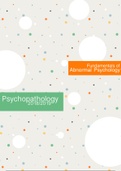'
¥8808
Fundamentals of
Abnormal Psychology
HSa→
Psychopathology
2018/2019
, ④ Ht # BITE # .
A
ABNORMAL PSYCHOLOGY . WHAT IS PSYCHOLOGICAL ABNORMALITY ?
The scientific study of abnormal behavior
undertaken to describe , predict , explain , yr D The four D '
s
and change abnormal patterns of LD Deviance ,
Distress Dysfunction ,
,
functioning .
and
Danger
1.1 DEVIANCE
D
Thoughts emotions and behavior NORMS
, ,
/
that is different from a society 'S A society 's stated and unstated
ideas about rules for
proper functioning proper conduct .
↳ grow from culture
is some societies may regard a certain behavior as abnormal
that other societies find normal
D
Abnormality also depends on specific circumstances
LD e.g .
natural disaster
1 .
2 DISTRESS
D behaviors ,
ideas ,
or emotions have to cause distress to be
labeled abnormal
1.3 DYSFUNCTION
D Abnormal behavior tends to dysfunctional
be
↳ it interferes with daily functioning
1. 4 DANGER
D Behavior that becomes dangerous to oneself or others
↳ most often the exception rather than the rule
, TREATMENT 2 .
WHAT IS TREATMENT ?
A systematic procedure designed
/
to
change abnormal behavior into p Al , forms of treatment have three
more normal behavior .
Also called essential features
therapy .
LD A sufferer who seeks relief
from the healer
CD A trained , socially accepted healer , whose expertise is accepted by
the sufferer and his or her social group
CD A series of contacts between the healer and the sufferer ,
through
which the healer tries to
produce certain changes in the sufferer 's
emotional state ,
attitudes ,
and behavior
3 . HOW WAS ABNORMALITY VIEWED AND TREATED IN THE PAST ?
3 . A ANCIENT VIEWS AND TREATMENTS
TREPHINATION
An ancient operation which
D Abnormal behavior =
victory by evil spirits
in a
\ stone instrument used to cut
↳ cure : force demon from victim 's body was
away
afrieraayaabrnoredmagnb%af.fr
skull to
D Abnormal behavior = demonic possession .
LD cure : exorcism
3. 2 GREEK AND ROMAN VIEWS AND TREATMENTS ( 500 B -
C . to 500 A - D .
HUMORS D Philosophers and physicians offered
According to the Greeks and Romans different explanations and treatments
, /
mental LD Hippocrates :
illness has natural
baondiabpnyh.effeiafsuntongtm.mg?uence causes
CD treatment correct physical pathology
underlying
:
3.3 EUROPE IN THE MIDDLE AGES :
DEMONOLOGY RETURNS ( 500 A . D . to 1350 AD )
D
arow.by distrust of science ,
-
Demonology
↳ church more powerful
CD cure :
exorcisms
3. 4 THE RENAISSANCE AND THE RISE OF ASYLUMS ( 1400 to 1700 )
D
Demonology declined
LD Johann Weyer : the mind is as susceptible to sickness as the body
D
community and home support for people with mental disorders
ASYLUM
D Mid Noth century : not enough
capacity anymore
A
type of institution that first became popular
/
↳ conversion of hospitals into in the sixteenth century to
provide care for
asylums persons with mental disorders . Most asylums
-
D intention :
good care became virtual prisons .
→ overflow lead to bad conditions
, 3. 5 THE NINETEENTH CENTURY : REFORM AND MORAL TREATMENT ( 1700 -
1900 )
D Philippe Pinel :
patients should be treated with sympathy and
kindness
MORAL TREATMENT D new laws and greater
funding to improve
tareainnnegteeeonpih E' muenrsraea
.gg?Enhaitgn/9Eeaefnmmennrt
that emphasized moral guidance and
of th
humane and respectful treatment .
D
By the end the tg century ,
moral treatment declined
↳ money and staffage shortages ,
lower recovery rates ,
and
overcrowded hospitals
↳ new wave of prejudice
3. 6 THE EARLY TWENTIETH CENTURY
SOMATOAENK PERSPECTIVE D physical factors Le -
g .
fatigue ) are
/
The view that abnormal functioning responsible for mental dysfunction
physical causes .
LD biological approaches yielded
disappointing results throughout the
first half of the 20 th
century
PSYCHOGENIC PERSPECTIVE D hypnotism demonstrated its potential
/ LD
The view that the chief causes of Friedrich Mesmer , hysterical disorders
abnormal functioning are psychological LD influenced Freud 's psychoanalysis
4. RECENT DECADES AND CURRENT TRENDS
4 .
1 HOW ARE PEOPLE WITH SEVERE DISTURBANCES CARED FOR ?
D 19505 :
Discovery of medication PSYCHOTROPIC MEDICATIONS
↳
antipsychotics and Drugs that affect the brain
, antidepressants antianxiety drugs | mainly
→ lead to release of patients from hospitals and reduce
many
mmaennqaseymayrgtguornnsn.gg
.
DEINSTITUTIONALIZATION D Outpatient care has become the primary mode
The practice , begun in the eggs ,
of y
of treatment
releasing hundreds of thousands of LD if necessary ,
short hospitalizations
patients from public mental hospitals .
4 .
2 HOW ARE PEOPLE WITH LESS SEVERE DISTURBANCES TREATED ?
D PSYCHOTHERAPY
Outpatient care PRIVATE
↳ number and types of facilities have expanded |
An
arrangement in which a person
-
D e.g .
community mental health centers ,
crisis directly
pafusnsaeetihnegraspeinh.FI
intervention centers , family service centers ,
etc .
,






